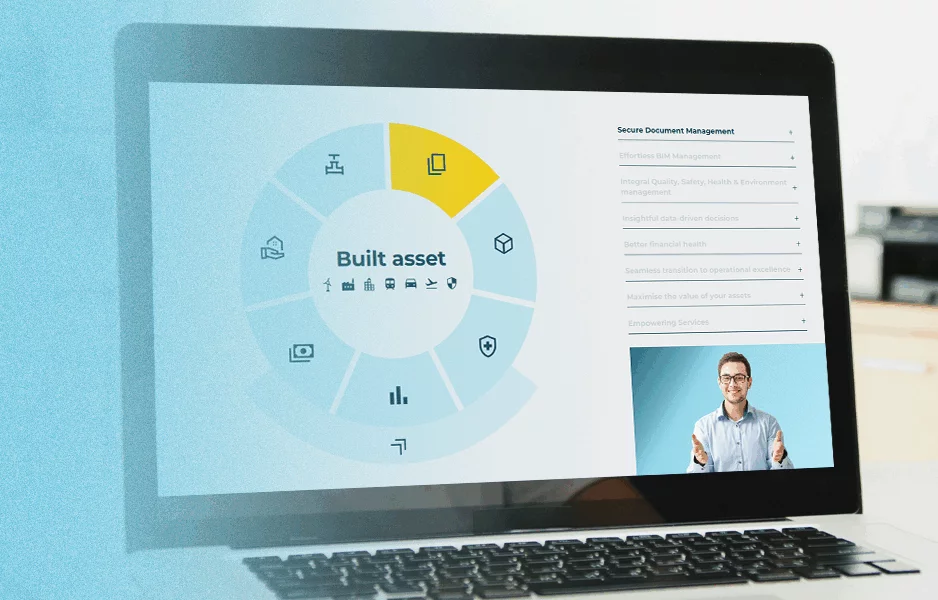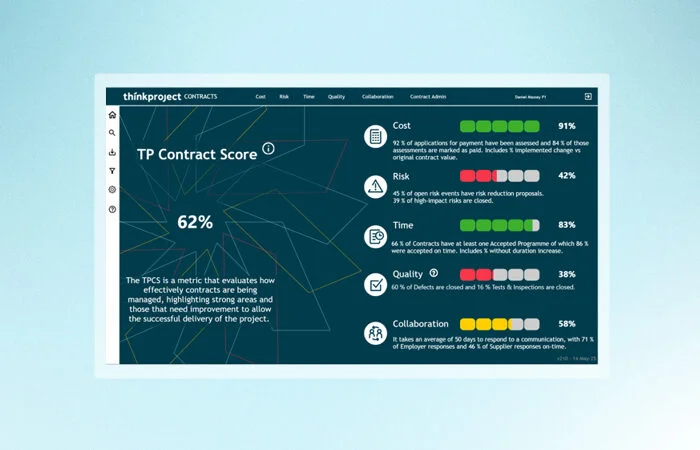
Cybersecurity in construction – protecting data in a digitally-driven industry
The construction industry is rapidly embracing digital transformation, with more and more construction firms now using cloud-based project management tools and other digital technologies. While these innovations enhance efficiency and collaboration, they also introduce significant cybersecurity risks. Cyber threats such as data breaches, ransomware attacks, and supply chain vulnerabilities can compromise sensitive project data and disrupt operations.
This blog explores the growing importance of cybersecurity in construction, the key challenges firms face, best practices for securing project data, and certifications that signal a strong commitment to digital safety.
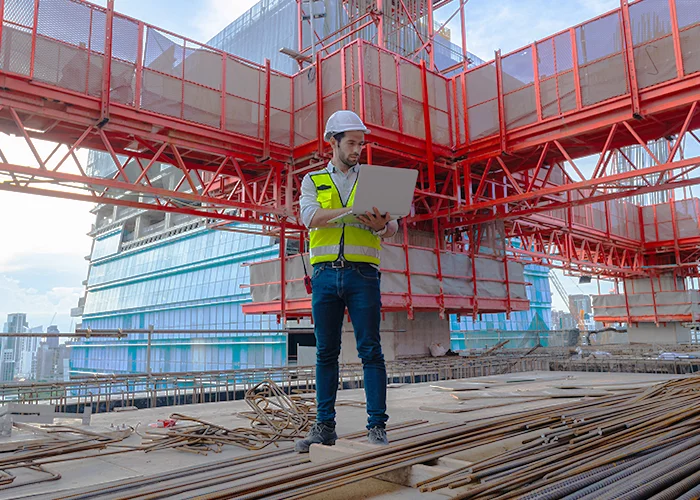
Why is cybersecurity in construction a growing concern?
As the industry adopts smart technologies and cloud-based platforms, cybersecurity in construction becomes essential. Construction firms handle large volumes of sensitive data—from blueprints and financial records to employee and client information. Any breach can result in significant financial, operational, and legal consequences.
The rise of ransomware and supply chain attacks has made the cybersecurity risk landscape more severe and complex than ever before. This is particularly concerning when it comes to critical infrastructure. Protecting critical infrastructure is vital because cyberattacks can endanger public safety, cause major economic disruption, compromise national security, and expose sensitive data. As these systems become more interconnected through smart technologies and IoT, they face increasing vulnerabilities—especially when built on outdated or poorly secured legacy systems.
Global trends highlight the risks:
France:
- In its 2024 cybercrime report, the Ministry of the Interior’s cybercrime command identified 278,770 cases in 2023, a rise of 40% in five years.
- According to Statista, around 9% of surveyed companies in the construction industry experienced cyberattacks.
United Kingdom:
- The UK’s construction industry has been ranked as the fifth most at risk from cyberattacks. According to an annual report by insurance giant Hiscox, almost half of UK firms have experienced a cyber-attack, with businesses experiencing a median annual loss of over £19,000 due to incidents.
- According to a UK government report, the percentage of businesses that have been targeted by cyberattacks is higher among large businesses, with 7% of respondents falling victims of cyber-facilitated fraud (vs. 3% of businesses overall).
- The same study has highlighted that construction businesses and utilities or production businesses were also more likely to have been victims of cyber-facilitated fraud.
Germany:
- According to a study by the digital industry association Bitkom, cyberattacks have caused damage of almost 150 billion euros in Germany in 2023.
- According to a Malwarebytes analysis, Germany was one of the main targets of ransomware attackers between April 2022 and March 2023. It was also the fourth most attacked country in the world at and the most attacked within the EU. The construction sector was particularly affected, at 12% – double the global average and significantly higher than the US, the UK and France.
- In its Cybercrime Federal Situation Report 2022, the Federal Criminal Police Office has highlighted that Germany’s critical infrastructure (CRITIS) faces rising cyber threats due to geopolitical tensions. These essential services—like energy, healthcare, and transport—rely heavily on uninterrupted IT systems. As a result, operators must meet strict legal cybersecurity standards, making robust information security vital not only for CRITIS but for the stability of society as a whole.
Cybersecurity challenges in construction
Despite rising threats, implementing cybersecurity measures in construction is challenging due to the industry’s structure and workflows. Common barriers include:
Increased digitalization
Modern construction projects rely on digital tools for everything from design and project management to procurement and communication. While these technologies improve efficiency, they also introduce vulnerabilities, especially when firms use unprotected networks or fail to update their systems regularly.
Supply chain vulnerabilities
Construction projects often involve multiple stakeholders, including architects, engineers, subcontractors, and suppliers. Each of these entities has access to various systems and levels of project data, creating potential entry points for cyber threats. A weak link in any part of the supply chain can expose the entire project to cyber risks, including data breaches and ransomware attacks.
Mobile workforce & remote access
Construction professionals often work on-site, requiring mobile access to project data. Remote work and the use of personal devices further increase the risk of cyberattacks, as unsecured connections can expose sensitive information to hackers.
Legacy systems & outdated software
Many construction firms still rely on outdated IT infrastructure that lacks modern security features. These legacy systems are more vulnerable to cyberattacks, as they often do not receive security patches or updates. Hackers exploit these weaknesses to gain unauthorized access to critical project data.
Best practices for information security in construction
To mitigate cybersecurity risks, construction firms must adopt a proactive approach to information security. Below are some best practices to strengthen data protection and reduce the risk of cyber threats.
- Access controls & Multi-Factor Authentication (MFA): Restrict access based on roles and require MFA for system logins.
- Encrypted communications: Use secure, encrypted file-sharing and messaging platforms for project data.
- Data backup & disaster recovery: Regularly back up data and test recovery protocols to maintain business continuity.
- Cybersecurity awareness training: Train staff and contractors to recognize phishing, social engineering, and common threats.
- Third-party risk management: Vet suppliers and subcontractors for cybersecurity practices before granting data access.
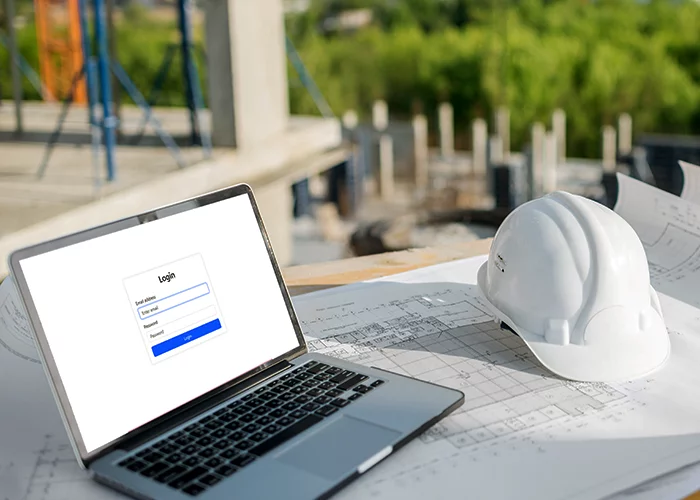
Certifications & attestations for data protection
Construction firms can demonstrate their commitment to cybersecurity in construction by obtaining industry-recognized certifications and attestations. These certifications help build trust with clients and partners by ensuring compliance with stringent data protection standards.
ISO 27001 – International standard for information security management
ISO 27001 is a globally recognized standard for information security management systems (ISMS). It provides a framework for managing risks related to data protection, ensuring that organizations implement best practices to protect sensitive information. Achieving ISO 27001 certification demonstrates that a construction firm has a robust cybersecurity strategy in place.
SOC 2 – Ensuring secure handling of customer data
Service Organization Control (SOC) 2 is an attestation that evaluates an organization’s security controls related to data protection. It is particularly relevant for cloud-based construction software providers and firms handling large amounts of customer data. SOC 2 compliance reassures clients that their information is secure and protected from unauthorized access.
GDPR & CCPA compliance – protecting personal and project-related data
With the growing focus on data privacy laws, construction firms handling personal or customer data must comply with regulations such as:
- General Data Protection Regulation (GDPR) – Applicable to firms working with clients in the European Union, requiring strict data protection measures.
- California Consumer Privacy Act (CCPA) – Governs how businesses collect, store, and share personal information of California residents.
Non-compliance with these regulations can lead to hefty fines and reputational damage.
NIST Cybersecurity framework – best practices for risk management
The National Institute of Standards and Technology (NIST) Cybersecurity Framework provides a set of guidelines for managing cybersecurity risks. It is widely used across industries, including construction, to develop secure IT infrastructures. Implementing NIST recommendations helps firms establish strong security measures, detect potential threats, and respond effectively to cyber incidents.
C5 – Cloud computing compliance in Germany
The C5 (Cloud Computing Compliance Criteria Catalogue) is a security standard developed by the German Federal Office for Information Security (BSI). It sets strict cybersecurity requirements for cloud service providers, ensuring secure data storage and processing in compliance with German and EU regulations. Construction firms using cloud-based tools and services can benefit from working with C5-certified providers to guarantee strong security measures for project data.
Cyber essentials
Cyber Essentials is a UK government-backed certification that helps organizations protect against the most common cyber threats. It involves a self-assessment that verifies five key security controls are in place: firewalls, secure configuration, user access control, malware protection, and patch management. This certification provides a baseline level of assurance, demonstrating that an organization has implemented essential cybersecurity practices.
Cyber essentials plus
Cyber Essentials Plus builds on the standard Cyber Essentials certification by adding a hands-on technical audit conducted by an independent assessor. This includes internal and external vulnerability scans, configuration reviews, and practical tests on selected systems and devices to verify that the security measures are effectively implemented. It offers a higher level of assurance and is particularly important for vendors handling sensitive information or working with government contracts.
Why do I need it? Understanding cybersecurity in construction
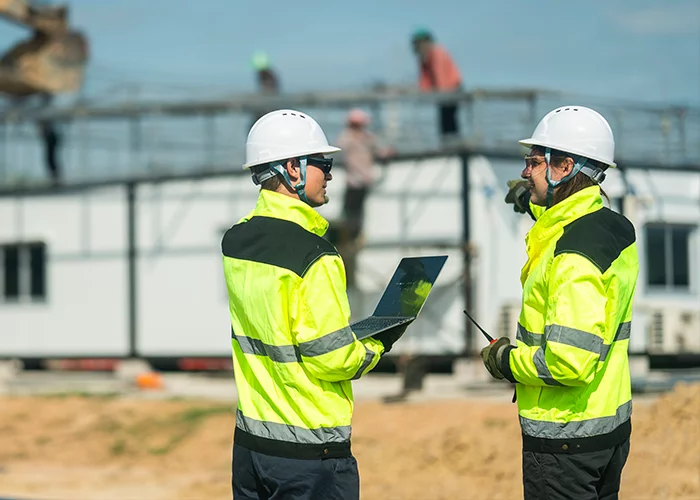
Cybersecurity in construction is more than just a technical concern—it’s a growing legal and operational necessity, especially when using cloud services to manage sensitive data like blueprints, employee records, or trade secrets.
Certifications such as C5 or SOC 2 can play a critical role by demonstrating compliance with industry and legal standards. For public sector projects or those involving critical infrastructure (KRITIS), these certifications are often mandatory, ensuring that cloud services meet strict security criteria from the outset of a contract. A C5 certificate, for example, not only confirms that a provider meets Germany’s minimum cybersecurity standards but also serves as trusted third-party proof that a cloud platform is secure and reliable—helping construction companies meet legal obligations and build client trust.
In an industry where projects are complex, data is sensitive, and digital tools are increasingly essential, cybersecurity in construction can no longer be an afterthought. From protecting intellectual property to meeting legal requirements and ensuring operational continuity, robust security practices are key to staying competitive and resilient. Certifications like C5 and SOC 2 offer a clear path to compliance and trust—proving to clients, regulators, and partners that your digital infrastructure is secure. As cyber threats continue to rise, investing in cybersecurity is not just smart—it’s essential for the future of construction.
Curious to learn more about how the right IT solutions can help you embrace digitalisation while keeping your data safe? Book a demo with us.


